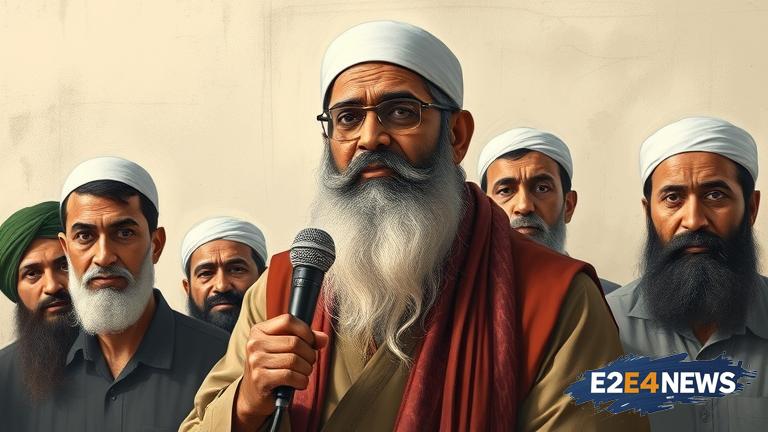A Pakistani cleric, Engineer Muhammad Ali Mirza, has been taken into custody by the authorities for allegedly making blasphemous remarks against Prophet Muhammad. The arrest was made after a video of Mirza’s speech went viral on social media, sparking widespread outrage and condemnation from various quarters. The cleric, who is known for his controversial views, had made the remarks during a lecture at a mosque in Lahore. The video of the speech was widely shared on social media platforms, including Twitter and Facebook, and was met with fierce criticism from Muslims across the country. Many people took to social media to express their anger and disappointment at Mirza’s remarks, with some calling for his arrest and prosecution. The Pakistani government has been facing pressure from religious groups and politicians to take action against Mirza, who has been accused of committing blasphemy. The country’s blasphemy laws are considered to be among the strictest in the world, and anyone found guilty of insulting Islam or its prophets can face severe punishment, including death. The arrest of Mirza has been seen as a move by the government to placate the religious groups and avoid any further unrest. The cleric’s remarks have been widely condemned by religious scholars and politicians, who have described them as unacceptable and hurtful. The Pakistani media has also been criticized for giving airtime to Mirza, who has been accused of spreading hate and intolerance. The controversy has sparked a debate about the limits of free speech in Pakistan, with some arguing that Mirza’s remarks were a clear example of hate speech. Others have argued that the government’s response to the controversy has been heavy-handed and that Mirza’s arrest is a blow to freedom of expression. The Pakistani government has been facing criticism from human rights groups for its handling of blasphemy cases, with many arguing that the laws are often used to target minority groups and settle personal scores. The arrest of Mirza has also raised concerns about the safety of religious minorities in Pakistan, who have long faced persecution and violence. The country’s Christian and Hindu communities have been particularly vulnerable to attacks and harassment, and many have been forced to flee their homes to escape violence. The Pakistani government has been under pressure from the international community to reform its blasphemy laws and protect the rights of minority groups. The controversy surrounding Mirza’s remarks has also sparked a wider debate about the role of religion in Pakistani society, with some arguing that the country’s Islamic laws are often used to justify violence and intolerance. Others have argued that the government needs to do more to promote tolerance and understanding between different religious groups. The arrest of Mirza has been seen as a test of the government’s commitment to upholding the rule of law and protecting the rights of all citizens, regardless of their religion or beliefs. The controversy has also highlighted the challenges faced by Pakistan’s liberal and progressive voices, who often face intimidation and violence for speaking out against extremism and intolerance. The Pakistani government has been accused of failing to protect these voices and of allowing extremist groups to flourish. The arrest of Mirza has been welcomed by many as a step in the right direction, but others have argued that it is only a small step towards addressing the deeper issues of intolerance and extremism in Pakistani society. The controversy is likely to continue to simmer in the coming days and weeks, with many calling for greater action to be taken against those who spread hate and intolerance. The Pakistani government will be under pressure to balance the need to protect religious sensitivities with the need to uphold the rule of law and protect the rights of all citizens.
